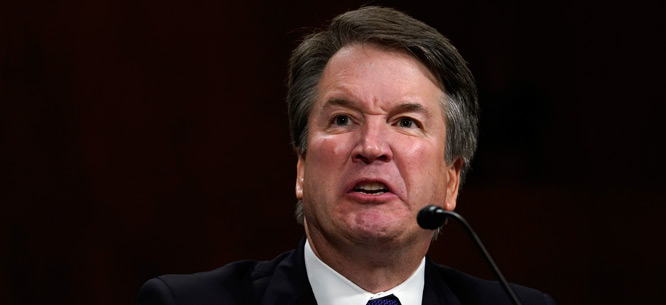Humble the Supremes
Humble the Supremes
It is time for Congress to rein in the exaggerated powers of the most undemocratic branch of the U.S. government: the Supreme Court.

This article is a preview from our Fall issue, which went to press before allegations of sexual assault against Brett Kavanaugh came to light.
The Constitution throws up a variety of obstacles to making the United States a truly democratic society: it allows Wyoming to elect the same number of senators as does California, which has nearly seventy times more residents; it requires supermajorities in Congress to pass and then three-quarters of the states to ratify an amendment; it makes it extremely difficult to turn corporate properties into public goods.
But the nation’s founding document does not prohibit making structural changes to what is the most undemocratic branch of government: the Supreme Court. In 1803, the Court, under Chief Justice John Marshall, took upon itself the power to rule acts of Congress unconstitutional. Anytime it liked, Congress could now abrogate that power—as well as expand the number of justices and restrict the number of appointments any president could make to the Court. Presidents could also agree to appoint only justices who agree to a term limit or to leave after they reach a certain age. The growing left, part of the vigorous resistance to Trump and his party, should demand they make such changes or come up with better ones that would make it impossible for unelected individuals with lifetime appointments to make decisions that affect the lives of most, if not all, Americans.
At the same time, leftists and liberals should shed the illusion that we can depend on the Court to play a vital part in creating a decent society. During the sixteen years that Earl Warren was Chief Justice, the Supremes did protect civil rights and establish a right to privacy. But conservative majorities on the Court later watered down or reversed some of its key rulings, while establishing a new right to donate unlimited funds to political campaigns that polls show most Americans oppose. For most of U.S. history, a majority of justices favored the rich, the white, and the corporate over working people of all races. Earl Warren and his allies were the exception, not the rule.
In the long run, it is both more principled and more productive to build movements and win elections whose victories the Courts cannot easily overturn. Even Justice Ruth Bader Ginsburg has criticized Roe v. Wade for having “stopped the momentum on the side of change.” She supports the forty-five-year-old ruling now, of course. But it would have been better, she argues, if legislatures had enacted reproductive freedom as a matter of women’s rights, rather than legitimating it with the abstract right of privacy. In a nation truly governed by its people and their elected representatives, Ginsburg and her black-robed colleagues would play a far smaller role in our politics than they do now.
Michael Kazin is co-editor of Dissent.






